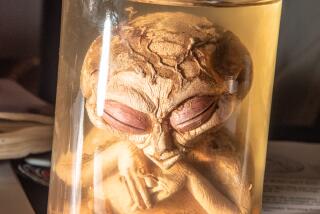Tour Guide Through Land of Oz : Feminist Scholar Delights Kids, Educates Adults
- Share via
GLENDALE — Children alternately squealed, giggled and screamed as a plucky little terrier bounced balloons, rolled a tin can with its nose and snapped at floating bubbles Tuesday in “The Land of Oz.”
The fluffy gray dog was obviously the hit of the show.
“I liked it when the dog popped the balloons,” said 7-year-old Catherine Oh, who reacted with delight, fear and wonder with more than 100 other youngsters at an unusual live theater performance at the Glendale Young Women’s Christian Assn.
The show, attended by youths in the YWCA’s three day-care programs for children from preschool age through sixth grade, was the culmination of a monthlong study of L. Frank Baum’s classic fairy tale, “The Wonderful Wizard of Oz.”
The featured performer was traveling scholar Sally Roesch Wagner, a feminist pioneer touring the country as a writer, lecturer and historical performer under a grant from the California Council for the Humanities.
Earlier in the day, Wagner had walked on stage at Glendale College as Matilda Joslyn Gage, a radical 19th-Century suffragette and abolitionist who attacked the institutions of church, state and marriage as progenitors of women’s slavery.
Dressed in a period gray coat and high-button shoes, wearing a black hat with a feather, a simple bag looped over her arm and carrying a single white chrysanthemum, Wagner related, in Gage’s words, the oppression women underwent in early America.
“Because of the teachings of the church, the foundation of Christianity is the oppression of women,” she told more than 100 college students and other adults at a program that was part of a series during Women’s History Month.
Her message from the college’s Mainstage Theatre was clear: that women were and, to some degree, still are oppressed by the rules of modern civilization. She contrasted the role of women in New York society in the late 1800s with highly respected positions held by American Indian women in nearby tribal nations.
Adopted into the Mohawk nation of the Iroquois, Gage was an outspoken feminist who campaigned for reform. She also was the mother-in-law of Baum, the prolific author of children’s books, which helps explain why Wagner took on a totally different character before the audience of children at the YWCA later in the day.
A research affiliate of the Women’s Resources and Research Center at UC Davis, Wagner not only is an expert on feminism but on Baum’s writings. She said she believes Baum based many of his characters in his 14 Oz books on the Iroquois’ religious, political, social and economic structure.
Her message to the children Tuesday was that a better world might be found in the utopian standards set by Baum for the Emerald City of Oz, where there was no war, no sickness or disease, no hunger, no rich or poor.
“I want the children to begin thinking about how they can change the world,” said Wagner, exhausted after an hour of working feverishly to retain the attention of the youngsters crowded around her. “Oz is an example of what a perfect world would be like.”
But Wagner, who has led thousands of workshops for children, admitted that her performance before the Glendale youngsters was one of the most challenging of her career because of the size and diversity in ages of the audience.
Wagner used a lap-top computer as the focus of her lecture, in which she sought to answer questions from children who had studied the Land of Oz in preparation for her visit.
She began the workshop by introducing the 4-year-old terrier, named Twink E., that she said is a direct descendant of the canine that played “Toto” in the classic 1939 movie. The dog performed a series of tricks at the commands of her owner, Betty Williams of Whittier, who was assisted by her daughter, Anita Williams of Glendale.
Children screamed and clapped hands over their ears as the dog chased and popped bouncing balloons.
“Does she bite?” one youngster asked cautiously.
The children shouted in unison for the dog to “sit” and “roll over.”
As the attention span waned for some of the youngsters, they were given large pieces of paper and crayons to draw their concept of the Land of Oz. Others fidgeted or played patty-cake with one another. But when it was over, many of the youngsters said they would remember the day as a special event.
Eunice Chae, 6, said she particularly liked the computer, because it was a “magic book” that offered answers to questions.
“It was fun,” she said, lining up to go back to her child-care center. “But I especially liked the dog.”
More to Read
The biggest entertainment stories
Get our big stories about Hollywood, film, television, music, arts, culture and more right in your inbox as soon as they publish.
You may occasionally receive promotional content from the Los Angeles Times.










